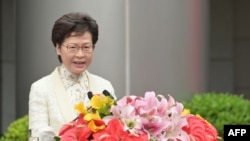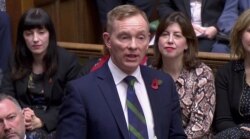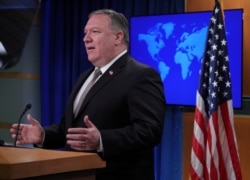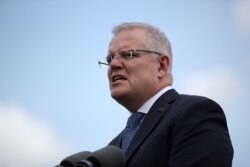British lawmakers are asking that so-called “Magnitsky-style” sanctions be used against Chinese officials, including Carrie Lam, Hong Kong’s chief executive, in response to Beijing’s recent imposition of a security law on Hong Kong.
Western nations are ratcheting up their response to the new security law, which severely limits the right to protest and criticize the Chinese government. The law punishes acts of secession, subversion, terrorism and collusion with foreign forces, with the threat of life in prison.
Britain, the United States and their allies are testing their leverage against China, a measure of global power as tensions rise between East and West.
Former Conservative Party leader Iain Duncan Smith is among several lawmakers calling on the British government to take a tougher line on officials in Beijing and Hong Kong.
“Carrie Lam, as I understand it, whose family have British passports — it needs to be made very clear to her that the action she has taken in line with the Chinese government make it very difficult for us to deal with her. And now, what we need to do is to teach her that this is a very, very bad decision,” Duncan Smith told VOA in a Skype interview July 10.
Duncan Smith has recently convened the Inter-Parliamentary Alliance on China (IPAC), a multinational group of lawmakers, to scrutinize China’s global influence.
Opposition Labor MP Chris Bryant echoed those calls in Parliament on July 7.
“I strongly urge the foreign secretary to look at another clause, which would include the repression of democracy and those rights of assembly and freedom of speech, and therefore look very carefully at whether Carrie Lam shouldn't be on the list,” Bryant told the MPs.
Britain recently imposed sanctions on Russian, Saudi, Burmese and North Korean officials under its new Magnitsky legislation, which enables the government to freeze assets and impose travel bans. Questioned on the issue in Parliament July 7, Foreign Secretary Dominic Raab did not rule out targeting Lam with sanctions and said the government is fine-tuning the legislation.
In 2018, Parliament passed a Magnitsky amendment to the Sanctions and Anti-Money Laundering Act, which allowed the British government to impose sanctions on people who commit gross human rights violations. The amendment is named after former Russian tax accountant Sergei Magnitsky, who died in a Moscow prison in 2009 after investigating multimillion-dollar fraud involving Russian tax officials.
Fears are growing that the pro-democracy movement in Hong Kong could be silenced by Beijing’s security apparatus. Over 500,000 people voted in weekend primaries in the territory to choose opposition candidates for September’s Legislative Council elections. It has been two weeks since Beijing imposed the national security law, and many residents fear their basic freedoms are being taken away.
“I do hope that the international community would see our solidarity and stand with us and help us,” said 24-year-old Grace Leung, a finance worker who was among those lining up to vote Sunday.
It remains unclear how much help Western nations can offer the people of Hong Kong.
Britain signed an international treaty with China when it handed over the territory in 1997, purportedly guaranteeing Hong Kong’s political freedoms for 50 years. U.S. Secretary of State Mike Pompeo said China’s new law breaks that agreement.
“Beijing said that for 50 years, they'd give the people of Hong Kong ‘a high degree of autonomy.’ And you all have seen what's happened after only 23 years — empty promises made to the people of Hong Kong and to the world,” Pompeo said at a news conference in Washington last week.
Australian Prime Minister Scott Morrison last week suspended its extradition treaty with Hong Kong and announced visa extensions for Hong Kong passport holders in Australia.
“For skilled and graduate visa holders, we'll be extending visas by five years from today, with a pathway to permanent residency at the end of those five years,” Morrison told reporters July 7.
The Australian move mirrors Britain’s citizenship offer for its overseas passport holders in Hong Kong. Duncan Smith said China should be confronted on multiple other issues.
“The Uighur population and forced sterilization and incarceration. You’ve got the problem with Hong Kong stripping away the rights of people to protest and to comment, which is astonishing, really. Their threats around Taiwan. Their control of the South China Sea — even though the U.N. tells them to get out. Their border clashes with India, and their complete disregard for anybody in China who disagrees with them,” he said, enumerating the issues.
Last week, the United States sanctioned three Chinese officials over their alleged involvement in the persecution of Uighurs in Xinjiang province.
China has reacted angrily and said other countries should not interfere in what it calls "internal affairs."
Relations between Beijing and the West appear destined to deteriorate further, said China professor Steve Tsang of the School of Oriental and African Studies at the University of London.
“In Beijing’s perspective, (President) Xi Jinping cannot be wrong. Xi Jinping can never admit he makes mistakes. And therefore, it’s very unlikely that China will revise its policy towards either Hong Kong, or for that matter the U.K.,” Tsang told VOA.









